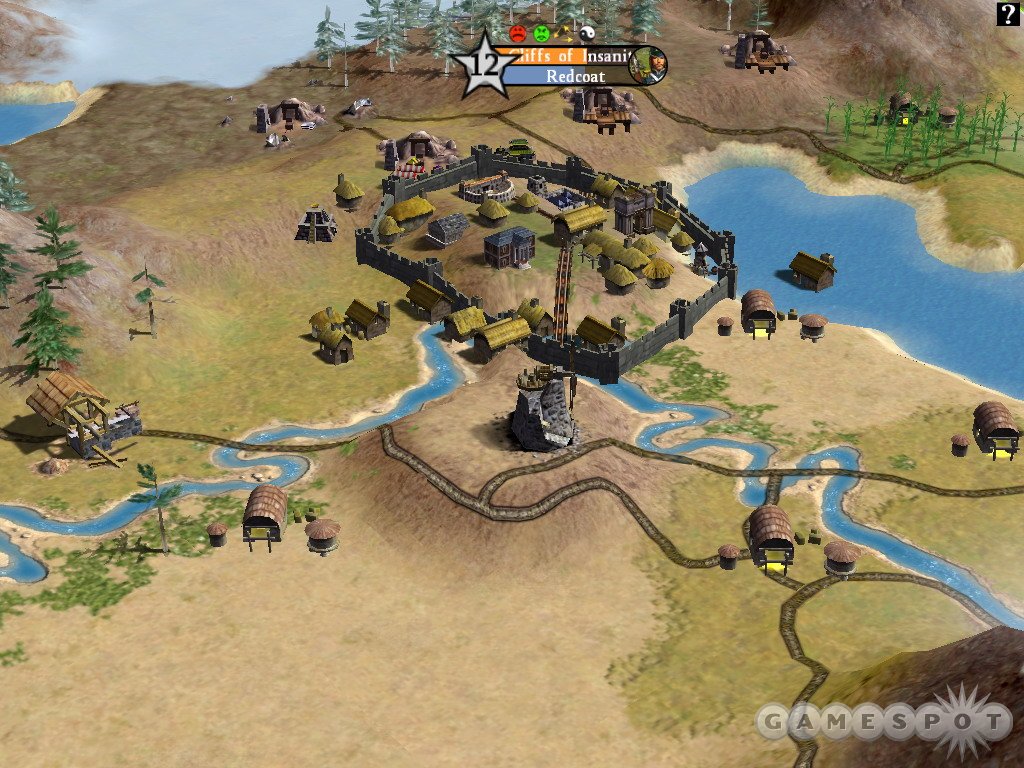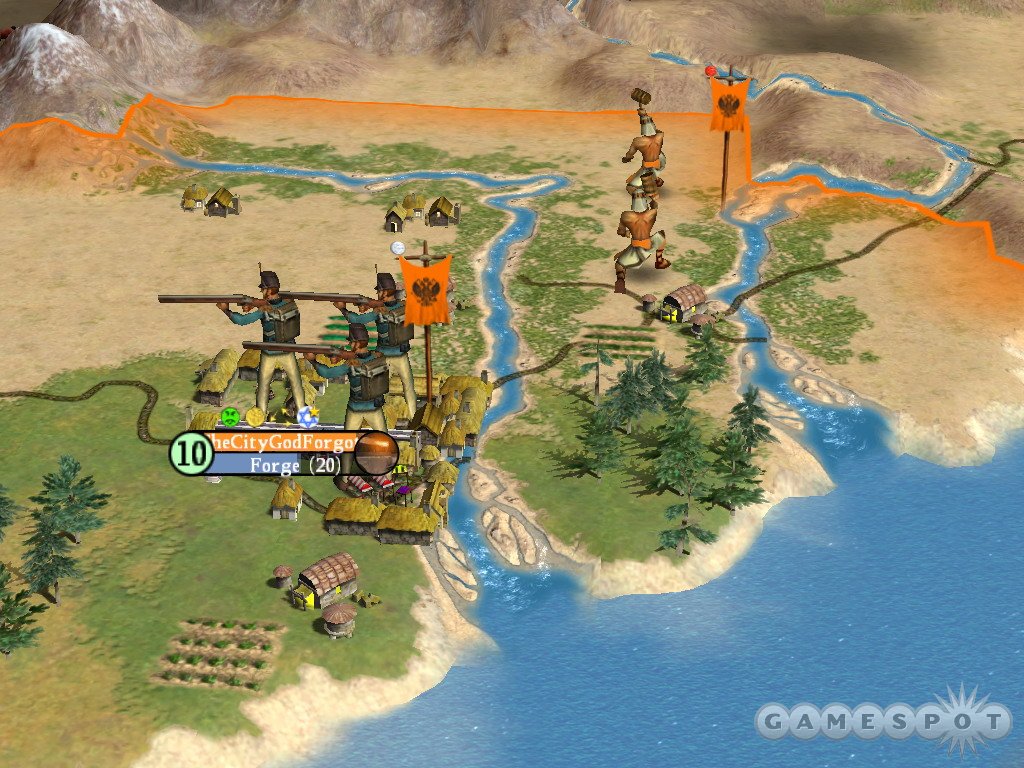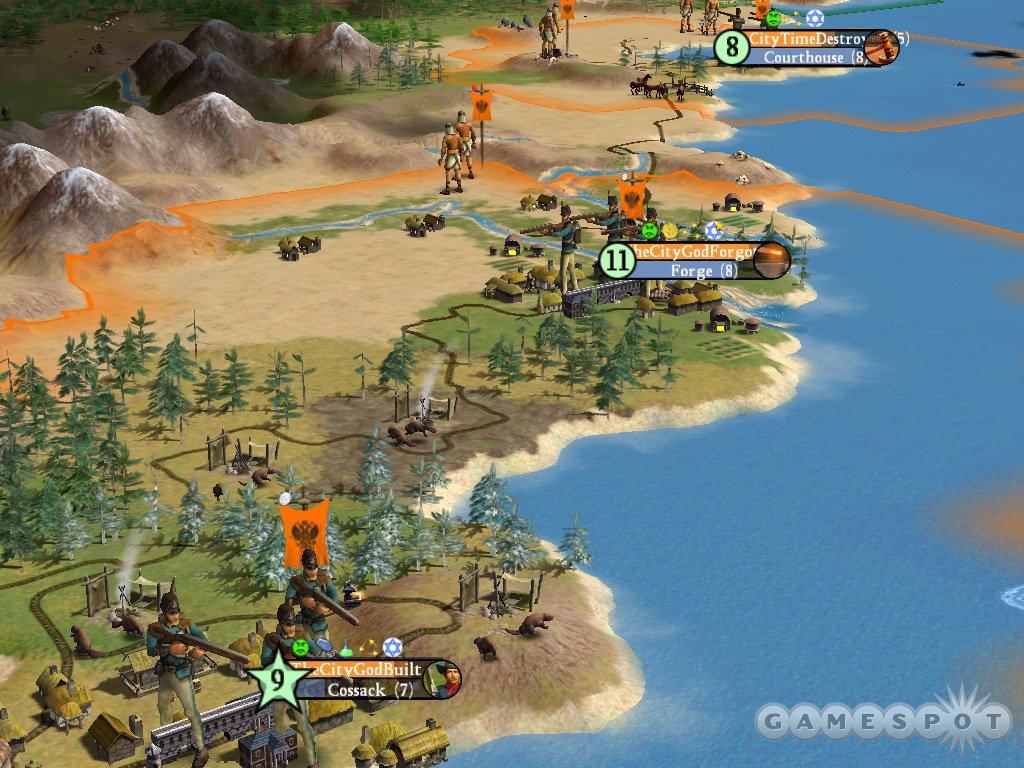Civilization IV Q&A - Post-E3 Questions
We came out of the E3 demo impressed, but also brimming with questions. Thankfully, senior producer Barry Caudill was happy to indulge us.
As the next chapter in the definitive PC strategy game franchise, Civilization IV is naturally one of the high-profile games of 2005. All that expectation comes with a lot of risk, though. Civ, as the series is simply known, is one of the most beloved and recognized brands in gaming, and each time the series is reinvented, the changes are closely scrutinized. Civ IV promises to upset the apple cart much more than its predecessors ever did, due to its bevy of changes. The designers have not only implemented a 3D engine for the first time, but they've also rewritten many of the gameplay conventions that have remained the same since the first Civ.

The basic idea behind Civilization is that you start with a small tribe in the Stone Age, and you must guide it through history. You explore your surroundings and expand your civilization by founding new cities. You research new technologies that represent the breadth of human innovation. You engage in diplomacy and war with your neighbors and rivals. And you end the game either in control of the world, or as yet another civilization swept into the dustbin of history. While that formula remains the kernel behind Civ 4, pretty much everything else that you know about Civ has been modified or tweaked. The game had an excellent showing at E3 this year, and we came out of the demo impressed and brimming with questions. Thankfully, Barry Caudill, the game's senior producer, was more than willing to indulge us. Civ IV ships this winter.
GameSpot: First off, what are your feeling now that E3 is over? Has Civ IV picked up a lot of fans to add to its already-dedicated fan base after the show?
Barry Caudill: E3 was very good to us this year. We had a lot of great coverage in the tried-and-true gaming press, as well as a ton of consumer press exposure. The Civanon marketing promotion kickoff was very well received, and I think we have a lot of momentum as we head toward the finish line.
GS: The E3 presentation raised as many questions as it answered. For instance, the new unit and combat system seems to eliminate the ability to stack units on top of each other. Or will you still be able to do that?
BC: You can still stack units and move them as a group, but I believe the new system promotes a combined arms approach rather than indiscriminate stacking. There are many shortcuts available for selecting any or all units on a given square, and the game determines the best attacker when you give a stack attack order, or the best defender when your stack is attacked.
GS: We know that the team is getting rid of long-standing conventions that have been in the Civ series for years, including the way pollution and corruption were treated in the game. But how will you replace them? Pollution and corruption are two very important balancing factors. For instance, players won't have to worry about cleaning pollution squares, but will it reduce production in some way?
BC: As balancing factors go, cleaning up individual pollution squares is not very fun. We would rather keep the balancing factor and provide interesting decisions without adding in any tedium. Pollution is still a factor, as it will go to the overall health of the city, and that affects numerous things, including production.
GS: We understand that this will be a "shorter" Civ game, in that it will feature somewhat faster play thanks to the fact that there aren't as many turns. Could you elaborate on that? Is the goal to get a game that's playable in a night, as opposed to several days, like Civ III and Civ II often required?
BC: There will be three game speeds: normal, quick, and epic. Normal will be just what you would expect from a game of Civ based on any of the previous versions. Quick, on the other hand, will have all of the values (tech costs, build costs, etc.) tweaked to provide a much quicker game that still retains the flavor of a normal game. It's possibly a one-night experience, but we are still balancing it. At the opposite end of the spectrum is the epic game speed, which will provide diehard Civ addicts with a much longer game time that is balanced to still feel correct.

GS: How does religion work, exactly? Do you have to research an individual religion before you can convert to it, much like you had to research different government types in earlier Civ games? And once you have religion, how do you defend against encroaching religions so they don't convert your cities?
BC: The first person to discover certain technologies will find the religion associated with that technology, so you don't have to have the technology to convert. The easiest way to keep other people's missionaries out of your territory is by eliminating any open border treaties you might have. That would mean that the missionary unit could not cross your border without its owner declaring war first. Keeping your religion strong by aggressively building religious buildings and being aggressive in pushing your own religion with missionaries will also help.
Meet the Pit boss
GS: You must have thousands of user-submitted design requests and tips, but what was the process for designing Civ IV? Did the team just sit around a table and decide that nothing from the previous games was sacred? Did the team solicit outside views? When did the process begin? 
BC: I seem to remember Soren Johnson (the lead designer) saying that the "official" fan suggestion document for Civ III was over 200,000 words, or roughly one-third the size of the Bible, so I guess you can imagine how many suggestions we had for Civ IV. We are very design-driven and we play games a lot, so the ideas are always in the back of our brains somewhere. Soren had a lot of tremendous ideas to start, and then the original prototype team spent lots of time just playing games and talking. Prototype development began over two years ago.
In the meantime, we started ramping up our internal beta team from the Civ III expansions. They started playing multiplayer games last spring and we have received tons of balance and gameplay suggestions from them as well. Currently, there are over 100 active members in our private community and they are a never-ending source of great information and ideas.
GS: How big has the jump to 3D been, in practice? It's more than just Civ with 3D graphics, it seems. How did the team incorporate 3D graphics to streamline and improve the interface and the game? And strategy gamers always get nervous about 3D games, because some of them tend to have older systems, so what kind of machines are you looking at to run Civ IV?
BC: We had a couple of things to help out with the transition. We are using the Gamebryo engine so we can be up and running quicker without the investment of time and resources necessary to develop a new engine, and we already shipped Sid Meier's Pirates! using the same engine. That means we had a head start and we were able to start creating right away. The move to 3D allows us to really bring the world to life. Being able to handle lighting, effects, and animations in real time makes tweaking the visuals so much easier than having to prerender. We definitely don't want to alienate anyone, so we are keeping the minimum spec pretty reasonable. It will most likely be the same as for Pirates: a 1 GHz CPU, 256MB RAM, and a 32MB video card with hardware transform and lighting capabilities.
GS: Multiplayer was a topic that wasn't touched upon in depth at E3, but there are certainly interesting tidbits that have been revealed thus far, including the persistent server mode. How will that work? What are the other multiplayer modes? Some critics have suggested that previous games in the series never really successfully embraced multiplayer gameplay. How will Civ IV succeed where previous games faltered?
BC: Our persistent turn server is called "pit boss" and it will allow for players to play for as long as they want when everyone is connected. When people have to leave, the game can continue with players logging in for their turn, downloading the current game state, taking their turn, and then saving for the next player. At any time, they could all jump back in and continue in a real-time fashion again. It's like playing a streamlined version of play by e-mail or hot seat multiplayer.
In real-time games, players will be able to play in simultaneous turn mode where everyone is moving at the same time. It makes for a faster-paced game. Players will also be able to form permanent or temporary alliances in which they share things like research and visibility with a partner or partners, and there is a new alliance victory condition as well.
Civ IV multiplayer will succeed because it already has succeeded in that regard. As I mentioned above, we have been playing multiplayer games for over 18 months now, so we know this will be the best out-of-the-box multiplayer Civ experience ever.
GS: We understand that Civ IV will be extremely mod-friendly, and users will be able to modify the game extensively. What kind of mod support is built into the game? Just how far will mod makers be able to go?

BC: Mod makers will be able to do nearly as much as they want. There are several ways mod makers can edit the game with increasing levels of complexity. At the most basic level, players can enter the world builder at any time to tweak a map or create a new one from scratch. They will also be able to place cities and units and create starting conditions. The next level is editing the XML. Here, mod makers will be able to change game values, alter prerequisites, edit diplomacy text, add new civilizations, etc. People who are comfortable with programming can edit the Python scripts and add events and other higher-level game functions. Finally, hardcore programmer types will be able to edit things like the AI with the SDK. All in all, we expect for many people to have fun creating mods of all levels.
GS: Thanks, Barry.
Got a news tip or want to contact us directly? Email news@gamespot.com
Join the conversation